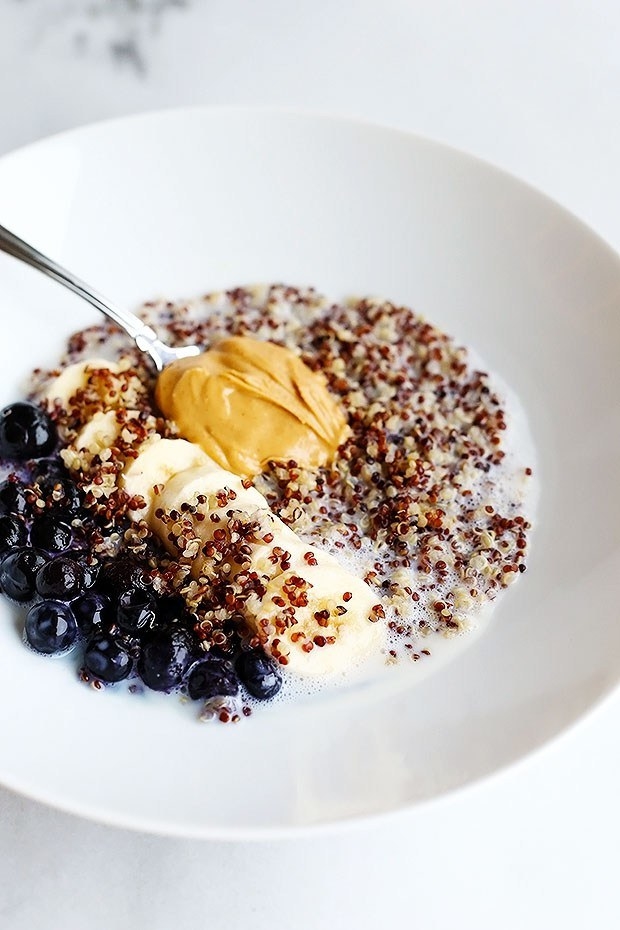Are you actually crying right now?

NBC
A stress-free way to start the day.

Zoë Burnett / BuzzFeed

Oatmeal is great, but don’t overlook quinoa as a healthy breakfast option. Recipe here.

This super easy treat is full of protein and healthy fats. Plus, it feels super decadent. Recipe here.

Pomegranate seeds are truly one of nature’s greatest gifts. Recipe here.
Because at a certain point, it’s more than PMS.
Welcome to BuzzFeed’s Mental Health Q&A, where we consult with experts to answer your biggest mental health questions. Have a question about mental or emotional health, happiness, relationships, stress, or anything else? Hit us up at MentalHealthQs@buzzfeed.com.

Hi,
I was diagnosed with major depression a couple of years ago, and while I’m still working it out, I have it pretty much under control right now. Without fail, however, crushing sadness/apathy/emotional numbness or a combination of those greet me about three days before my period starts.
At what point does this cease to be normal PMS and become something that maybe can or should be treated? Who should I talk to about this?
Thanks!
-Anonymous
Hey Anonymous! So, full disclosure, right off the bat: You’ll have to see a doctor to know for sure what’s going on with you specifically.
In the meantime, we talked to Dr. Catherine Birndorf, clinical associate professor of psychiatry and obstetrics and gynecology at Weill Cornell Medical Center and Dr. Mary Jane Minkin, clinical professor of obstetrics and gynecology at Yale School of Medicine, about the relationship between your period and depression. Here’s what they had to say:
Loryn Brantz / BuzzFeed / Via Facebook: BuzzFeedComics

“Functional impairment” – meaning when something gets in the way of your day-to-day life – is where experts draw the line between typical negative emotions and an actual disorder. We’ll get to what those disorders might be in a second, but there are a few questions you can ask to know if something more serious is going on than regular PMS.
“Have you missed work or school?” says Birndorf. “Do you stay home a day or two a month because you’re so miserable with these symptoms? Is it, ‘I’m sad and moody and don’t want to leave the house’ or is it, ‘I’m so miserable or angry or depressed that I can’t?'”
And if that sounds like you, that’s when it’s time to talk to a doctor. When you do, these are the things they’ll probably go over with you:
ABC / Via alliefallie.tumblr.com
https://instagram.com/p/BJwzBsGhYxk/embed/
In the simplest terms, PMDD is really bad PMS. According to the DMS-5, to be diagnosed, you have to have five of the following symptoms (and at least one of the first four):
What’s also important here is that your symptoms are cyclical, says Minkin – AKA most of the month you’re completely fine, then anywhere from a few days to two weeks before your period (everyone’s different), the symptoms set in. And then once you start your period, they lessen and go away. Rinse and repeat.
Spoiler alert: it’s probably mono.

Nickelodeon / Via Twitter: @ColIegeStudent

It’s easy to get sick in college for several reasons:
* Infectious diseases tend to spread where large groups are clustered together – like in dorms, libraries, lecture halls, gyms, and frat houses. Everything from a head cold and strep throat to serious bugs like norovirus and meningitis flourish among college students.
* And communal living means that most students will spend all four years sharing bathrooms, bedrooms, or living spaces with friends or strangers.
* Also, college can be a stressful shitshow. Taking care of yourself can often go overlooked, so students tend to have a lowered resistance when it comes to infections.
Oprah Winfrey Network / Via cdn1.theodysseyonline.com
BuzzFeed Health spoke to Dr. Pritish Tosh, infectious disease specialist at the Mayo Clinic in Rochester, Minnesota, and germ expert Kelly Reynolds, PhD, director of environmental health sciences at the University of Arizona, about how college students can stay healthy when the odds (and germs) are against them.

It’s basically like taking a sip of all the germs, bacteria, and viruses in the other person’s mouth. Sharing cups or bottles is a quick and easy way to expose yourself to a number of things, from cold sores to mononucleosis (mono).
Mono is usually called the kissing disease because it’s transmitted through saliva, but you can also get it from sharing drinks, so it spreads like wildfire on college campuses. It can cause fever, fatigue, spleen issues, and a sore throat lasting up to six weeks, which is a very long time to be out of commission in college.
So just don’t share cups. Even during beer pong. It will not destroy your skill or credibility to take a drink out of your own damn cup or can, and not the one that grimy pong ball landed in.
Mikeygen73 / Getty Images / Via thinkstockphotos.com